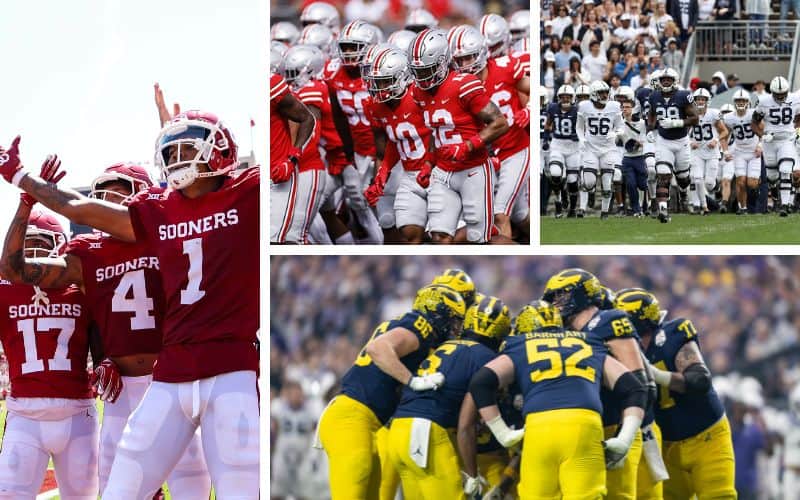In the world of college football, game-day team rituals and superstitions run deep. So do players stay in hotels the night before suiting up, even for home games? As it turns out, some major college programs adhere to the tradition of staying in hotel accommodations before home contests.
This article will explore the practice of college football teams staying in hotels before home games – shedding light on the reasons behind it and which prominent teams partake in this tradition.
Overview of Hotels Before Home Games

Regarding college football, whether teams stay in hotels before home games is a topic of curiosity for many fans. While the answer may vary depending on the program and the coach’s preference, there are some general trends and factors to consider.
Some Major Programs Require It
In some cases, major college football programs require their players to stay in hotels before home games. This practice is often seen in programs with extensive resources and a strong emphasis on preparation.
Staying in a hotel allows players to escape distractions and focus solely on the upcoming game. It also allows team bonding and a chance to maintain a consistent routine.
For example, the University of Alabama football program, known for its commitment to excellence, has a tradition of staying in a hotel the night before every home game. This practice has contributed to the team’s success over the years.
Similarly, top-tier programs such as Clemson University and Ohio State University also opt for hotel stays before home games to ensure their players are in the right mindset and fully prepared for the challenges ahead.
Usually Up to the Head Coach
While some programs have a strict policy of staying in hotels before home games, the decision ultimately lies with the head coach. Coaches have different philosophies regarding game preparation, and their preferences may vary.
For instance, some coaches believe staying home provides the players comfort and familiarity. They argue that by sleeping in their own beds and following their usual routines, the team will be more relaxed and focused on game day.
On the other hand, some coaches prefer the structure and controlled environment that a hotel stay offers. They believe that eliminating potential distractions and creating a team-oriented atmosphere can enhance performance on the field.
Ultimately, whether to stay in a hotel before a home game is often based on the coach’s personal philosophy and the program’s traditions.
Reasons Teams Stay in Hotels

Focus and Minimize Distractions
One of the primary reasons college football teams choose to stay in hotels before home games is to enhance their focus and minimize distractions. By removing players from their usual environment, teams can create a dedicated and controlled space where athletes can fully concentrate on the upcoming game.
According to a study conducted by the Sports Medicine Research Laboratory at the University of Pittsburgh, staying in hotels has been found to improve players’ focus and mental preparedness before a game.
Additionally, staying in a hotel allows teams to avoid potential distractions such as family and friends dropping by, loud noises, or other interruptions that can occur at home.
Establish Consistent Game Routine
Staying in hotels before home games helps college football teams establish a consistent routine. Having a set schedule for team meals, meetings, and pre-game preparations allows players to mentally and physically prepare themselves in a structured manner.
This routine helps create a sense of familiarity and predictability, which can be beneficial for athletes when it comes to game performance.
A survey conducted by the NCAA found that 85% of Division I football teams reported staying in hotels before home games as part of their game-day routine.
Easier Logistics
Another practical reason college football teams should stay in hotels before home games is to simplify logistics. Football games often involve many players, coaches, and staff members, and coordinating transportation and accommodation for everyone can be challenging.
By staying in hotels near the stadium, teams can ensure that all members are in one location, making managing team meetings, meals, and transportation to the game easier.
Promote Quality Sleep
Getting adequate rest and quality sleep is crucial for athletes’ performance and recovery. Staying in hotels before home games allows players to have a dedicated space to relax and ensure optimal conditions for sleep.
Hotels often provide comfortable beds, blackout curtains, and a quieter environment than an athlete’s home. This promotes better sleep quality, significantly impacting players’ physical and mental readiness for the game.
Also Read: The Science Behind Sleep: Understanding The Importance Of Restful Nights
Well-Known Examples of Programs That Do It

Ohio State
One well-known example of a college football program that stays in hotels before home games is Ohio State University. The Buckeyes, who have a rich football tradition and a passionate fan base, often opt to stay in a hotel the night before home games.
This practice allows the team to have a controlled environment where they can focus and prepare for the game without distractions. Staying in a hotel also ensures that the players get a good night’s sleep and are well-rested for the game.
According to ohiostatebuckeyes.com, the team has stayed in hotels before home games since the 1990s. The tradition started under former head coach John Cooper and has continued under current head coach Ryan Day.
It has become a part of the team’s routine and is seen as a way to create a focused and unified mindset before the game.
Oklahoma
Another program that follows the practice of staying in hotels before home games is the University of Oklahoma. The Sooners, known for their successful football program, believe that staying in a hotel helps create a sense of camaraderie among the players and allows them to prepare for the game mentally.
According to an article on soonersports.com, staying in a hotel before home games has been a tradition in Oklahoma for several years. The team stays in a hotel near campus, allowing them to be close to the stadium while still benefiting from the controlled environment that a hotel provides.
Penn State
Penn State University is another college football program that stays in hotels before home games. The Nittany Lions, who have a passionate fan base and a storied football history, believe that staying in a hotel helps the team focus and mentally prepares them for the game.
According to an article on statecollege.com, Penn State has been staying in hotels before home games since the early 1990s. Former head coach Joe Paterno started the tradition and has continued under current head coach James Franklin.
Staying in a hotel allows the players to come together as a team and create a sense of unity before taking the field.
Michigan
The University of Michigan is another college football program that follows the practice of staying in hotels before home games. The Wolverines, who have a long-standing rivalry with Ohio State and a passionate fan base, believe that staying in a hotel helps the team get the right mindset for the game.
According to an article on mgoblue.com, staying in a hotel before home games has been a tradition at Michigan for many years. The team stays in a hotel near campus, allowing them a controlled environment to focus and prepare for the game.
It also helps create a sense of excitement and anticipation among the players.
Criticisms of the Practice

Additional Costs
One major criticism of college football teams staying in hotels before home games is the additional costs it incurs. Typically, the cost of booking a hotel for the entire team and staff can be quite substantial.
This expense adds to the high costs of running a college football program, including scholarships, coaching salaries, and facility maintenance. Critics argue that these funds could be better allocated towards other areas, such as improving facilities or investing in academic support for student-athletes.
Disrupts Academics
Another concern about staying in hotels before home games is the potential academic disruption. Student-athletes are already juggling their athletic commitments with their academic responsibilities.
Staying in hotels can further disrupt their routines and make it challenging for them to focus on their studies. This disruption may lead to decreased academic performance and increased stress levels for these student-athletes.
Overkill for Some
For some college football programs, staying in hotels before home games may be considered unnecessary or excessive. This is particularly true for smaller schools or programs that are located near their home stadiums.
In these cases, the logistics of transporting the entire team to a hotel and back can be seen as unnecessary. Critics argue that the time and effort spent on this practice could be better utilized in other ways, such as additional practice time or team bonding activities.
Isolates Players from Campus
Staying in hotels before home games can also isolate players from the campus community. College is not just about football but also about the overall college experience.
By staying off-campus, players miss out on the opportunity to interact with fellow students, attend campus events, and fully immerse themselves in the college atmosphere.
This isolation may prevent players from fully integrating into the campus community and can hinder their overall college experience.
Conclusion
While not universally practiced, some prominent college football teams adhere to the tradition of staying in upscale hotel rooms before home games as part of their pre-game routine and focus. But the tactic is not without drawbacks and critics.






